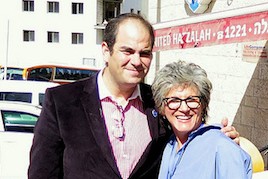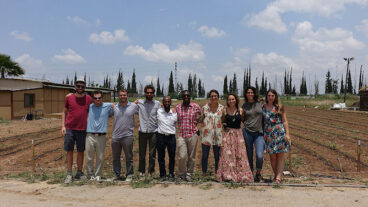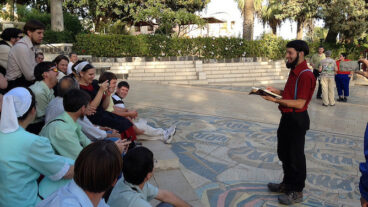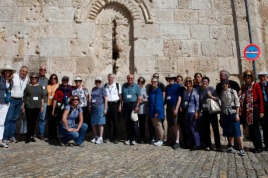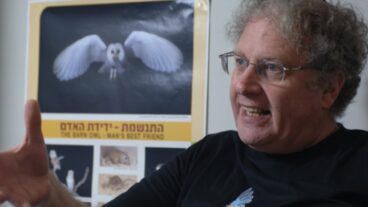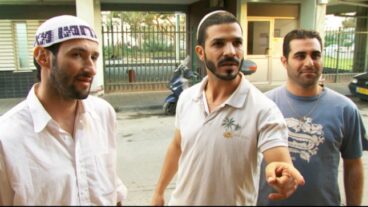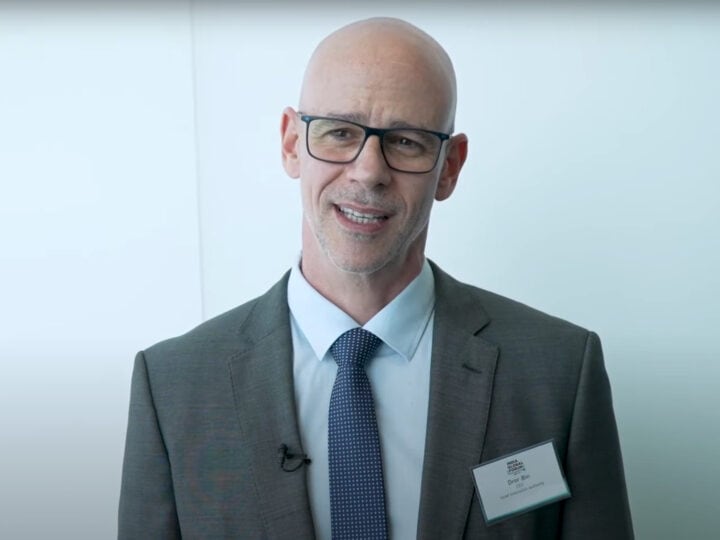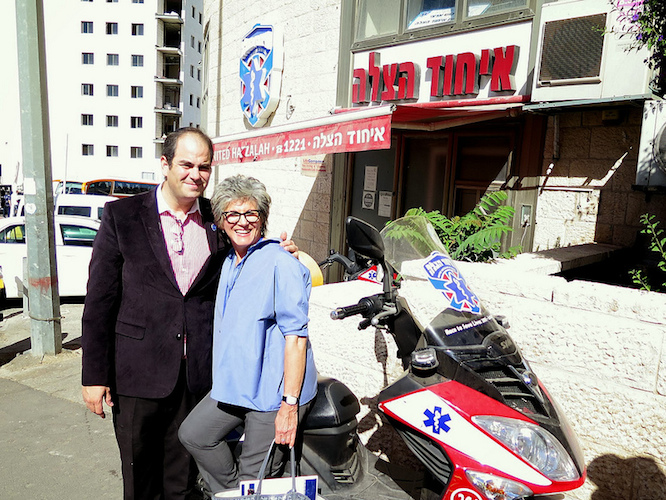
- United Hatzalah of Israel founder Eli Beer with Journey to Israel tourist Cynthia Stroum
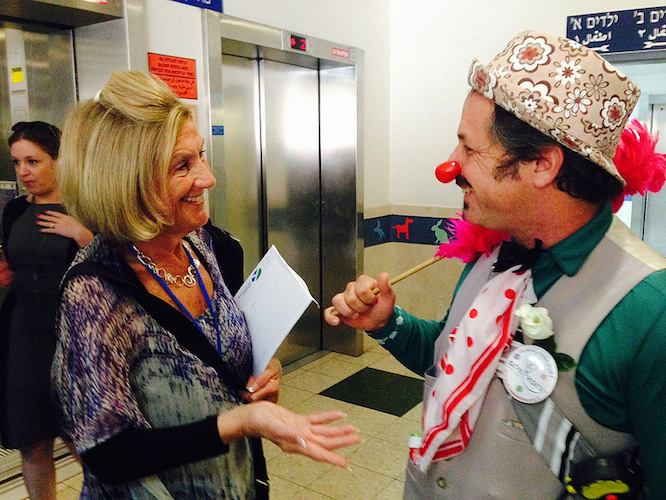
- Therapeutic clown Professor Sancho charms Susan Libitzky
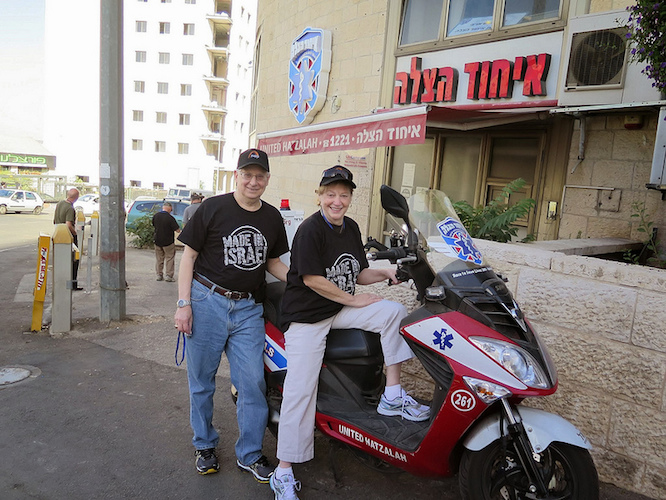
- Steven and Karen Ostrove check out an ambucycle outside United Hatzalah headquarters in Jerusalem
The moment Professor Sancho steps into the children’s ward of Emek Medical Center in Afula, smiles begin to light up on faces.
He fiddles ludicrously with a screen, pushing it one way, then another, managing in the meantime to get in everyone’s way. Then he takes a parent in a wheelchair for a test drive around the ward, pretending it’s a car that he’s just purchased with an enormous dollar bill.
You’ve probably guessed it already – Professor Sancho isn’t a doctor. He’s a clown. Studies suggest, however, that medical clowns can be as effective as medicine, so while Sancho might wear a red nose, a ridiculous hat and a colorful outfit, his job is as vital on the ward as the real professors who visit the children with the stethoscopes and white coats.
One of those studies came from Emek Medical Center itself. Dr. Yaron Lang, head of pediatrics at the hospital, headed a study involving 142 babies and children undergoing radionuclide scanning for urinary tract infections, a procedure where the child must lie perfectly still.
Normally the procedure is carried out with sedation, but with the help of a clown, over 14 months, only five percent of the kids undergoing this scan needed sedation, as opposed to 100% under control conditions. Now it is hospital procedure not to use the sedation, but for the child to be accompanied by a clown instead.
The hospital, which is located in Israel’s northeast, is also a model of coexistence where Arab and Jewish patients are treated side by side by both Arab and Jewish doctors.
“There is something amazing going on here,” Larry Rich, director of development at the hospital, told ISRAEL21c Journey to Israel tour participants. “Arabs and Jews work here together for the well-being of everyone.”
Emek was just one of the many fascinating places that we have visited in the last few days.
On Wednesday, the morning began in Jerusalem with a talk by Eli Beer, who founded the volunteer emergency response system United Hatzalah of Israel in 2006. The organization has brought together some 2,100 trained volunteers from every sector of Israeli society to respond to medical emergencies in Arab and Jewish neighborhoods, and in June this year won the 2013 Victor J. Goldberg IIE Prize for Peace in the Middle East from the New York-based Institute of International Education.
Next up, a complete shift of gears – on to Jerusalem Venture Partners (JVP) Media Quarter in a beautiful renovated Bauhaus building near the city’s newest cultural destination, The First Station.
The JVP Media Quarter has been making waves in the media scene since it was founded by the venture capital firm in 2002. It is the brainchild of Erel Margalit, founder and chairman of JVP, and now provides a workplace for some 300 employees.
Some of the companies in the fold include Anyclip, Funtactix, Comqi, Celltick, Reduxio, ThetaRay and WiShi. WiShi is a new social fashion styling platform set up by two women, allowing users to create their own virtual closets. Expect to see a fuller report on WiShi in our feature section shortly.
From there the group had a relaxing ride up to Naharayim, the Israeli-Jordanian “peace island” that sits on the border of the two countries, next to the Jordan and Yarmouk rivers.
The park is the site of an old hydroelectric power station built in the late 1920s and ’30s. It ceased operations in 1948, and in 1994, with the signing of the peace treaty by Jordan and Israel, the island was returned to Jordan but leased with special visitation status to Israeli and international tourists.
At nearby Kibbutz Ashdot Yaacov we received a glimpse into the pioneering spirit that first built the kibbutz in the 1920s and then transformed it into a still thriving community in 2013.
On Thursday it was up early after a night at Nof Ginosar on the shores of the Sea of Galilee to visit Emek Medical Center, then on to wine tasting at Tulip Winery.
This family run business produces some of the best wines in Israel, using Cabernet, Shiraz, Sirah and Petit Verdot grapes grown at four different vineyards located in the north and along the Judean Hills.
Aside from winning awards for its wines, Tulip has also won accolades for establishing its winery in Kfar Tikva, a residential community in the Jezreel Valley for adults with special needs. It works closely with the members of the community, including several who work at the winery.
After a light lunch at Tulip, we drove to the Technion-Israel Institute of Technology in Haifa to meet professors and students involved in some of the country’s most cutting-edge research.
In September, the Technion announced that it had received a $277 million donation from the Li Ka Shing Foundation. Part of this money is a $130m. grant to the Israeli university to upgrade its home campus, and the rest is to be used to establish a new academic technological institute in China with the Shantou University.
The new Technion Guangdong Institute of Technology (TGIT)
will focus on the fields of engineering, science and life sciences, and the goal is to begin offering undergraduate programs in the 2014 academic year.
The Technion is also working with Cornell University in New York to construct a campus of technology at Roosevelt Island off Manhattan. This school will grant joint Technion and Cornell degrees.
Participants ended the day with a meal at Deca in Tel Aviv, a restaurant recognized by many food critics as one of the country’s best.
Look out for the next blog item on Friday’s events.




